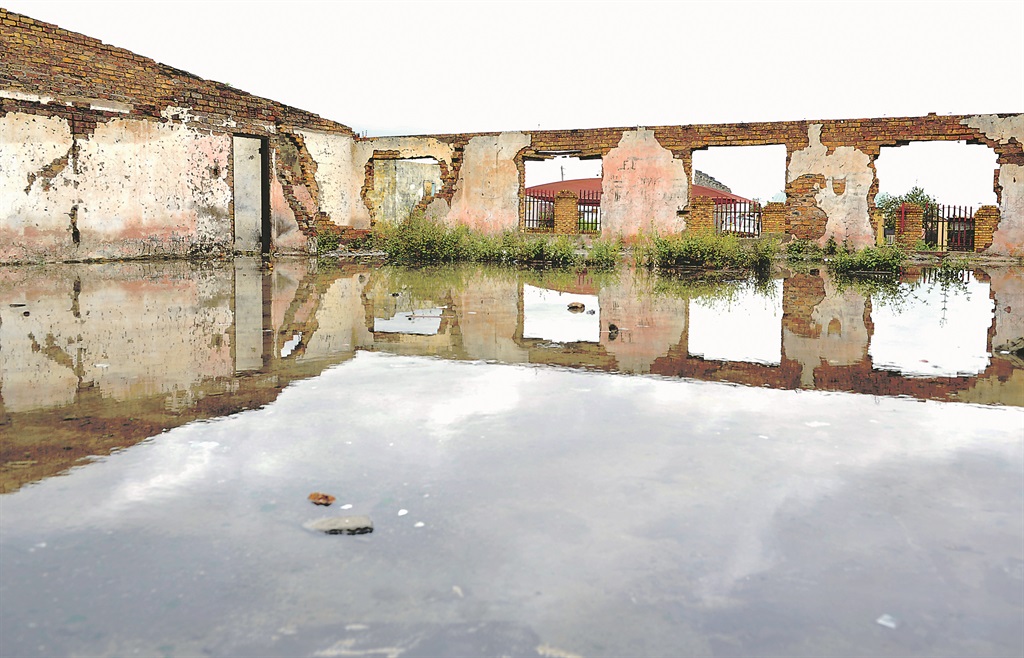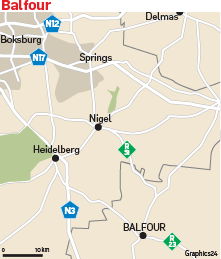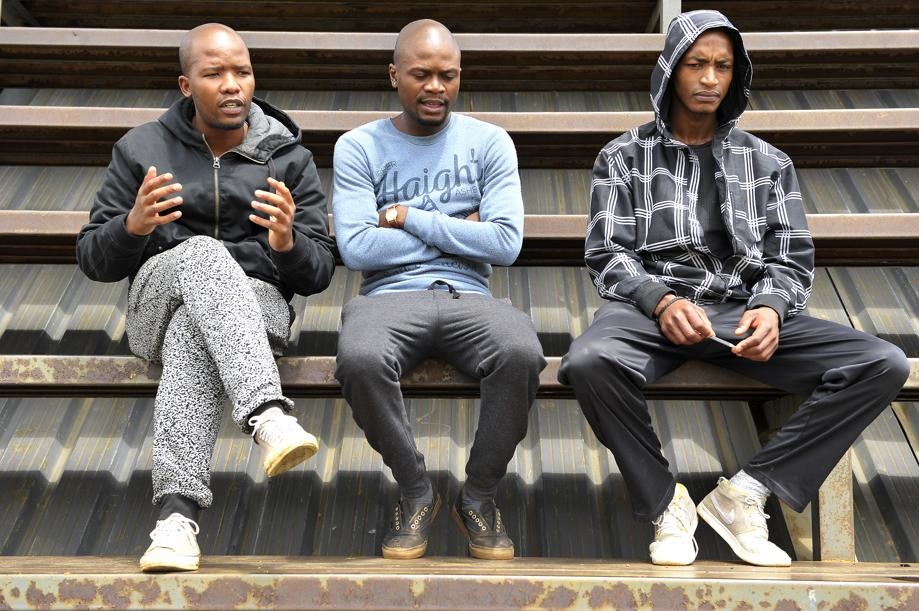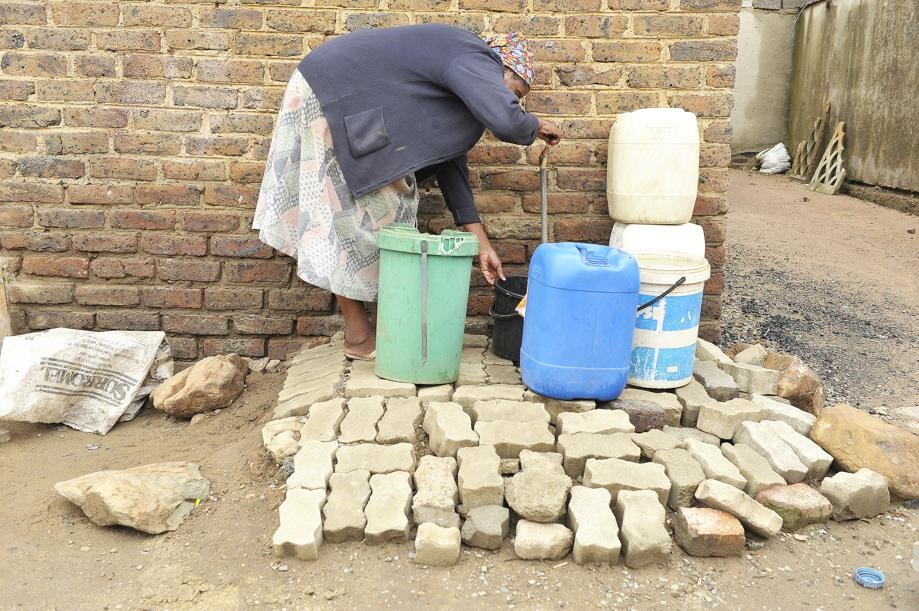
Following service-delivery protests in 2009, government pledged to act on residents’ demands. Sizwe sama Yende went to see what changed. Elizabeth Sejake took the pictures
The sporting complex of Siyathemba township near Balfour, Mpumalanga, is overgrown with grass. The unkempt complex, surrounded by precast walls, has a bumpy soccer pitch, a tennis court and vandalised dressing rooms.
There was a netball court, built in 2014, before its surface was scraped off to make way for a car-spinning pitch. On whose authority this was done, nobody really knows.
The complex is a microcosm of deteriorating service-delivery standards in the Dipaleseng Local Municipality, even though angry residents staged violent protests in 2009 and 2010 in a bid to nudge national government to pay attention to the lack of services in their areas.
President Jacob Zuma heard the community’s complaints and visited them with an entourage of Cabinet ministers and provincial politicians at the stadium on August 4 2009 – but close on seven years later, very little has changed.
A presidential team comprising national, provincial and Gert Sibande district officials was subsequently appointed to monitor the municipality and ensure that the community’s demands were met.
The sports courts were built by the Gert Sibande District Municipality as part of keeping promises to the residents.
The residents’ demands included:
- Their redemarcation into Gauteng;
- A constant and reliable water and electricity supply, as well as garbage removal;
- Land for residential stands;
- A police station to be built in the township to curb escalating crime;
- Job opportunities in locally based private businesses; and
- The employment of competent managers and councillors in the municipality.
It is midday on Thursday, March 10, when City Press finds three young men sitting on the stadium’s grandstands. There is no soccer match or anything else happening.
Michael Lebotha (24), Tumelo Msimango (25) and Siphesihle Nhlapho (24) are among the frustrated youth and, sitting there, they are brainstorming ideas “to create jobs for ourselves”. They say they want to venture into event management.
They were teenagers and still in high school when they joined the rest of the community in protest and burnt the township’s only library and government vehicles. They also witnessed shops owned by Somalian nationals being looted.
The trio are not hopeless individuals like some of their nyaope-addicted peers in Siyathemba. They went on to study at tertiary institutions, but came back to sit at home because job opportunities in Dipaleseng, like elsewhere in the country, are scarce.
In a bid to avert defeat in the upcoming elections, the ANC in Mpumalanga has reshuffled the Dipaleseng council.
Dipaleseng mayor Sarah Nhlapho was demoted and given a position as municipal public accounts chairperson in the Gert Sibande District Municipality.
The ANC governs the municipality with a slight majority. In 2011, it won seven of the 12 council seats.
One seat went to an independent councillor, Mafunda Makhubu, who left the ANC after service-delivery protests in 2009 and 2010, and won backing from some of the residents.
Makhubu convincingly won Ward 4 in the 2011 local government elections, by 1 452 votes out of the total of 2 106 that were cast.
Another seat went to a local organisation, the Socialist Civic Movement, and the rest to the DA.
Mpumalanga’s ANC secretary, Mandla Ndlovu, says the party has identified Dipaleseng as one of the “hot spot” municipalities that have been underperforming.
Makhubu and other former ANC members have since formed a new political party, the Sisonke Progressive Party, to contest the elections.
“The Gert Sibande regional executive committee was requested to assist the municipality to turn the situation around, but instead, the situation worsened,” said Ndlovu.
The ANC provincial executive committee met the Sisonke Progressive Party’s founders last month and promised to give them the speaker’s position in the council, provided they ditched their plan to contest the elections.
Makhubu has subsequently been appointed the speaker while a mayoral committee member, Dickson Kanye, has been appointed the new mayor to replace Nhlapho.
Nhlapho has been very unpopular with the community – so much so that her house was torched last year after the Municipal Demarcation Board announced that Dipaleseng would be amalgamated with the Lekwa Local Municipality in Standerton.
Dipaleseng’s municipal manager, Vusi Ngcobo, has been unable to go to work since December 10 after SA Municipal Workers’ Union members accused him of corruption and staged marches demanding that he leave.
Ngcobo, who was appointed three years ago to turn the situation around, is now set to be redeployed to the Mpumalanga department of cooperative governance and traditional affairs.
Lebotha has a diploma in construction management from Northern Virginia College in the US.
Msimango has an electrical engineering diploma (heavy current) from the Tshwane University of Technology.
Nhlapho studied mechatronics at the Sedibeng Technical Vocational Education and Training College.
They are still disillusioned with government’s service-delivery performance in their area.
“Yoh! A lot has not changed here,” says Lebotha, the most talkative of the three friends, flashing a glittering gold tooth.
“Our roads and other infrastructure are still bad. We always have to protest to get things done and it is not right, because we end up vandalising the little we have,” he says.
Ntombi Sibeko (66) has had to adopt nocturnal habits to get water. Every night, the pensioner interrupts her sleep to ensure she fills up her containers before the tap starts gushing nothing but air.
At her home in Siyathemba Extension 2, water is only available between midnight and 4am. This is better than other areas, which still do not get a single drop of water.
“I cannot sleep properly because I have to get water. It is dark and I risk my life going out,” says Sibeko, who sells kota (a hollowed-out quarter loaf of bread filled with atchar, potato chips and polony) to schoolchildren for a living.
“Water supply remains our biggest problem. We have to fill buckets to flush the toilets,” she adds.
“Electricity supply is another problem, because there are outages that last for two days and no one in the municipality warns us.”
City Press sees tarred streets with gaping potholes and the overgrown cemetery.
The only visible changes in the four years we have been visiting the area – at least once a year – is the paving of some streets and the installation of street lights – which are, however, not maintained and aren’t working.
About 200 RDP houses were built last year in Ward 4, the shack section of the township. Opposition parties suspect that this project was undertaken to sway votes, taken by independent councillor Mafunda Makhubu in 2011 back in favour of the ANC ahead of the 2016 local government elections.
Makhubu has since rejoined the ANC and, only last month, the provincial executive committee appointed him speaker of the Dipaleseng council in a desperate reshuffle to salvage the party’s influence in the town.
However, there is still no police station. Water supply continues to be erratic in some parts of Siyathemba and totally unavailable in others, while refuse removal is done only once in a while. Electricity outages are also still regular.
The young men complain that water comes out of taps as a brown sludge and the residue needs time to sink to the bottom of their containers.
The nagging feeling that their town does not belong in Mpumalanga province is also grudgingly persistent. There is not a single mode of public transport from the township or Balfour going to Ermelo, where the Gert Sibande District Municipality is situated, let alone to the nearest Mpumalanga town of Standerton (80km east of Balfour) or the capital city, Mbombela, about 400km away.
Comparatively, Heidelberg in Gauteng is merely 25km away, and patients from Dipaleseng use the hospital there because it is the closest one available. Most people here study and work in Gauteng.
“We have no relationship with Mpumalanga. I think that is why development does not come here. Since the passing of Sicelo Shiceka (the late minister of the department of cooperative governance and traditional affairs), the issue of our redemarcation into Gauteng has been swept under the carpet, despite promises to redemarcate us,” says Lebotha.
Now, the Municipal Demarcation Board has proposed that Dipaleseng be amalgamated with the Lekwa Local Municipality in Standerton.
“This does not make sense,” argues Lebotha. “You can go to Gauteng to drink coffee and come back while someone else is still on the way to Standerton.”
Although Telecommunications and Postal Services Minister Siyabonga Cwele reaffirmed the ANC’s promise in March last year that the municipality would be redemarcated into Gauteng, nothing has happened.
Cwele, along with Mpumalanga’s safety and security MEC, Vusi Shongwe, and cooperative governance MEC Refilwe Mtsweni, visited Siyathemba to placate residents after they staged a violent service-delivery protest against the demarcation board’s decision.
DIPALESENG’S MUNICIPAL MANAGER, SAILOR NETSHIVHALE, RESPONDS:
- The municipality acknowledges its shortcomings in delivering services – particularly water, electricity, refuse and the maintenance of infrastructure.
- A contractor has been appointed to attend to all the water problems, which can only be described as a “calamity”.
- Plans include increasing the capacity of reservoirs, as bulk water-storage facilities and main lines are in place as a long-term measure to ensure that the water supply meets the demand as Siyathemba township continues to grow.
- About 134 more households now have access to water, as Extension 6 of Siyathemba has been reticulated.
- With regard to electricity, outages still occur, but they do not last as long as the residents claim. There is always an emergency team on standby to deal with challenges, even after normal working hours.
- In the 2016/17 financial year, the municipality will be appointing a contractor to replace ageing infrastructure, including transformers, within the municipality.
- With regard to refuse collection, this municipality collects rubbish at least once a week in all the towns except in informal settlements, where the unemployed are given this responsibility through the social poverty-alleviation programme.
- When the municipality experiences challenges with equipment, such as the breakdown of ash trucks, the community is usually kept informed of such situations. It then develops a plan to address backlogs.
- With regard to roads, budget constraints continue to hamper the municipality’s endeavours to construct and rehabilitate all its roads.
- The municipality spent R14.2 million to construct the Mofokeng, Sebiloane, Zwane and Monareng streets in the 2014/15 financial year.
- A total of 5km of paved streets in Nthoroane, valued at R10 million, were constructed by Sasol Mining as part of its social and labour plan.
- With regard to street lights, high-mast lights were installed in Siyathemba in the 2010/11 financial year and maintenance backlogs are being addressed.
- The municipality is running a special incentive programme with the aim of writing off residents’ debt and encouraging consumers to adopt a culture of paying for services.
“It is important to clarify that the municipality has a relatively low revenue base because of the current socioeconomic conditions of the community it serves,” says Netshivhale.
“This, however, does not prevent the municipality from enforcing its debt-collection policy whenever it is deemed necessary to do so.”
- With regard to the stadium, the municipality did not authorise anyone to scrape off the netball court for a pitch to spin cars.
- Grass cutting and general maintenance will be attended to.
TALK TO US
Do you think these new appointments will bring real change to the
municipality, or is it just more of the same?




 Publications
Publications
 Partners
Partners












